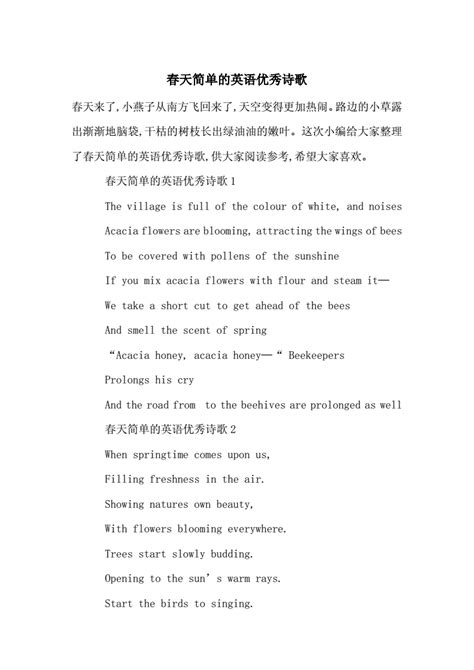有关诗歌的英语句子
Poetry is a form of literary art that uses language and aesthetic qualities to evoke meanings in addition to, or in place of, the prosaic ostensible meaning. It is a powerful medium of expression that allows poets to convey emotions, thoughts, and experiences in a condensed and imaginative way.
Origin and History of Poetry:
Poetry has a long history dating back to ancient civilizations such as the Mesopotamian, Egyptian, and Greek cultures. Over the centuries, poetry has evolved and diversified into various forms and styles, including epic poems, sonnets, haikus, free verse, and slam poetry.
Key Elements of Poetry:

1. Imagery: Poets use vivid and descriptive language to create mental images and stimulate the readers' senses.
2. Rhyme and Rhythm: Many poems employ rhyme schemes and rhythmic patterns to enhance their musicality and flow.
3. Metaphor and Simile: Metaphors and similes are commonly used in poetry to make comparisons and create deeper layers of meaning.
4. Tone and Mood: The tone of a poem reflects the poet's attitude towards the subject, while the mood evokes the emotional atmosphere of the poem.
Famous Poets and Their Works:
1. William Shakespeare: Known for his sonnets and plays, Shakespeare's poetry explores themes of love, beauty, and mortality.
2. Emily Dickinson: Dickinson's introspective and enigmatic poems delve into themes of nature, death, and the human experience.
3. Langston Hughes: A prominent figure of the Harlem Renaissance, Hughes' poetry highlights African American culture, identity, and social issues.
4. Sylvia Plath: Plath's confessional poetry addresses themes of mental illness, gender, and existential despair.
Benefits of Reading and Writing Poetry:
1. Emotional Expression: Poetry provides a creative outlet for expressing one's feelings, thoughts, and experiences.
2. Empathy and Connection: Through poetry, readers can empathize with the emotions and perspectives of others, fostering a sense of connection and understanding.
3. Catharsis and Healing: Writing poetry can be cathartic and therapeutic, helping individuals process and cope with their emotions.
4. Imagination and Creativity: Reading and writing poetry stimulate the imagination and encourage creative thinking and expression.
Tips for Writing Poetry:
1. Read Widely: Explore different poets, styles, and forms to expand your poetic horizons.
2. Practice Regularly: Cultivate a habit of writing poetry regularly to hone your skills and develop your unique voice.
3. Seek Feedback: Share your poems with trusted friends, writers, or mentors to receive constructive feedback and insights.
4. Revise and Refine: Don't be afraid to revise and rewrite your poems to improve their clarity, imagery, and impact.
Overall, poetry is a rich and vibrant art form that continues to inspire and captivate readers around the world. Whether you are a seasoned poet or an aspiring writer, engaging with poetry can lead to profound insights, personal growth, and a deeper appreciation of the beauty and power of language.
版权声明
本文仅代表作者观点,不代表百度立场。
本文系作者授权百度百家发表,未经许可,不得转载。








